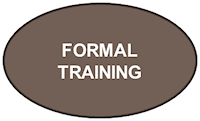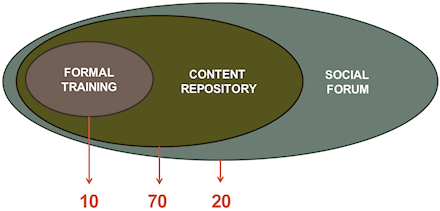One of my peers in Australia, Arun Pradhan, is developing an app to help us learn smarter, faster and deeper.
To gain insight on how we learn in the real world, he’s reaching out to L&D professionals, CEOs, entrepreneurs, actors and artists who have mastered complex skills, with the aim of uncovering our “learning secrets”.
Arun asks 4 specific questions and my answers are as follows…

Q1. In your working life, how have you learned effectively from experience, please provide an example if possible? (e.g. how have you used intentional practice, learned from failure, learned from ambitious projects and/or used reflection)
When I first got into e-learning, it was all very new for everyone. Of course computer-based training had been around for decades, but when the World Wide Web took off in the 1990’s, it transformed education.
When I assumed my first role in this space, I learned mostly through experience because there weren’t many alternatives available. I would learn what I needed to “on the go” or just in time, immediately putting it into practice and seeing how it went – whether that be the design of a web page by tinkering with HTML and JavaScript, or the production of a saleable product by getting onto the platform and just working it out.
Q2. In your working life, how have you learned effectively from people, please provide an example if possible? (e.g. how have you learned from project teams, mentors, coaches and/or broader social networks)
Over time I’ve realised that learning from other people is not only important but crucial to my professional development. Conferences get a bit of a beat-up these days, but I always learn something useful from seeing what other people have done. I also like meetups, and social media has taken my peer-to-peer networking to a whole new level.
I think it’s important to maintain relationships with people who are not only knowledgeable and experienced, but also open and generous; these relationships are two-way streets as you learn from each other. I also know someone whom I respect immensely and whom I consider a mentor; I seek his insight on matters that I’m thinking about, and I’ll bounce ideas off him to get his perspective.
So my recommendation is to actively engage with other people, utilising all the various means of doing so.
Q3. In your working life, how have you learned effectively from courses, research or investigation, please provide an example if possible? (e.g. how have you learned from reading on the web, reading books or attending conferences/courses)
It’s all very well to learn from experience and roll with the punches as you go along, but you have to beware not knowing what you don’t know.
When I decided to make e-learning my career, I went back to university to do a Masters in Learning Sciences & Technology. This course opened up my eyes to concepts that I would never have appreciated otherwise, such as learning theory, and raised my awareness of important empirical research.
Post-uni, I read lots of blogs and keep an eye on the academic journals. I also like to run my own “mini” research studies at work by trialling something new and seeing how it goes.
Q4. What’s your top advice for someone who wishes to develop faster and learn complex skills in modern workplaces?
You have to do it. Yes, read widely and talk to lots of people, but not at the expense of giving it a go. Only then can you gain the insights you really need and appreciate the nuances of real-life application.
The workplace is only ever going to get more VUCA, so by maintaining an experimental mindset you can be confident to take on whatever comes.
![]()
![]()
![]()
If you would like to respond to Arun’s questions, he invites you to do so here.









